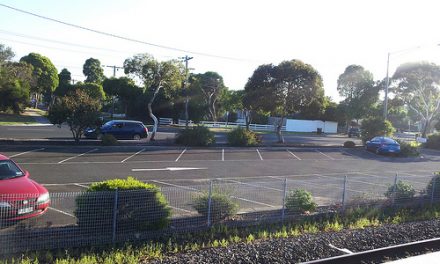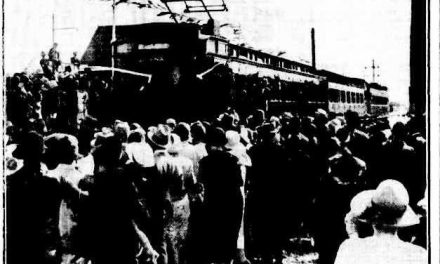Three years ago in 2008, peak-hour Werribee services were made to run direct to Flinders Street, bypassing the City Loop. The rationale for that change is to untangle the network and improve the network’s reliability as Werribee trains cross the path of Sydenham trains, creating delays. I will be very surprised if the Transport Department, Metro and the former Connex have not collected data to compare the service reliability before and after the “untangling”. I believe many Werribee line passengers will be interested that these statistics be made publicly available. Under the new timetable, all Werribee services will lose their City Loop access and passengers will have to hitch a ride on another service, such as the Sydenham service to get to City Loop stations.
Train punctuality problems usually occur during the peak hours when congestion takes place, leading to increased boarding and alighting times. It is less of a problem during non-peak hours when trains are able to handle a much lower passenger volume and keep to their schedules. Hence, I am very surprised that the Werribee trains bypass the Altona Loop during the non-peak hours under the new timetable. How will this change improve the Werribee service reliability during peak hours? Can this be a harbinger of worse changes to come in the future? Perhaps, Metro has the intention of turning the Altona Loop into a full-time shuttle service eventually? It has not done so at this point of time as this will draw too much resistance and protest from the Altona Community. Hence, it prefers to achieve this incrementally by first introducing the shuttle service during non-peak hours as a warm-up exercise. This will mainly affect the aged, disabled, students, stay-at-home mums and more importantly, a considerably low proportion of Altona passengers. Hence, the protest will be much more muted than if a large number of working passengers are impacted. When the people get used to the new system, become resigned to their “fates” and feel powerless to do anything that may turn around the situation, then Metro will start extending the shuttle service to the peak hours. We have seen this happening to the Werribee service so the same story may be repeated for Altona.
Andrew Lezala, CEO of Metro, said that the Greenfield timetables will be introduced in 4 stages. The first stage is the coupling of the Werribee and Frankston services to form a cross-city service. The fourth stage is again the introduction of cross-city services. I suspect that either the Altona Loop shuttle will run full-day during the fourth stage or the Sydenham service will be joined to an eastern line service, maybe the Glen Waverley service.
I will now attempt to predict the change in traffic behaviours of Altona passengers, as a result of the new timetable.
1. Some people have more flexible office hours so they can shift their travel to the shoulder peak period or slightly after to board less crowded trains. Now these people will be forced to travel during the peak hours in order to avoid the inconvenience and longer travel time of connecting trains at Newport. This will result in more congestion during peak hours.
2. Similarly, senior citizens and people with disabilities may schedule their travel from the non-peak to the peak hours as connecting 2 or 3 trains during the non-peak hours will be difficult for them to negotiate. They will be able to get a seat as Laverton trains start from Laverton.
3. Some people may deliberately delay their travel to the shoulder peak or non-peak period so that they can take the City loop service and do not need to change trains at North Melbourne or Southern Cross. Under the new timetable, the Werribee service no longer goes to the City Loop. There is no more incentive for these people to delay their travel. This again leads to more congestion during peak hours.
4. Altona passengers may need to take more than an hour to reach a City Loop station during non-peak hours under the new timetable (read my previous post). With the return journey, total time spent on commuting may consume more than two hours. Some Altona passengers will simply give up public transport and fall back on their cars, thereby increasing their carbon footprints.
5. I am surprised to learn from the Residents’ Action Group Meeting that a considerable number of Altona residents actually drive to Newport Train Station to catch the city-bound train there, due to the service unreliability of the Altona Loop. This new timetable will force more Altona passengers to drive to either Newport or Laverton, competing with the local residents there for parking spaces and increasing the demand for more carparks. A good train system is one in which passengers are more equally distributed among the train stations to make full use of the capacity of each station. A system in which people choose to travel to a distant station rather than a proximal one, such as in the case with Laverton Station, is an inefficient one and places unnecessary and disproportionate strain on particular stations.
6. Who are the people who will suffer most under the changes? The “weak” ones – senior citizens, people with disabilities, students, stay-at-home mums, part-time workers – those who normally travel during non-peak hours. Instead of providing more support to these groups of people to help them with their limitations, the new system is creating obstacles and hindrances to their travel. A considerable number of these people do not drive or are unable to drive. Public transport is their only means of commute. Some of them will simply give up travelling, their independence and connections with society at large. The new timetable may be accompanied by unforeseen social costs.
7. The train operator has been urging morning peak-hour Werribee and Williamstown passengers to change trains at Southern Cross instead of North Melbourne for getting to the City Loop. However, many people still prefer to connect to Sydenham, Cragieburn or Upfield trains at North Melbourne, as presumably this will take a shorter time compared to changing at Southern Cross. When Werribee trains lose access to City Loop even in non-peak hours, there will be no incentive for Werribee passengers to defer their travel to beyond the peak hours. Coupled with the increased number of passengers from Altona as mentioned earlier, this may cause both the connecting trains and North Melbourne Station to be jammed with even more people, thereby incurring further delays.
8. Under the new timetable, Werribee Line commuters, such as those using Werribee, Hoppers Crossing, and Aircraft stations, will receive significantly fewer services, not more (Ref 1). Weekday services from Werribee to the city will reduce by 16 services, and from the city to Werribee will reduce by 14 services per day. There are now already a significant number of people who drive from as far as Werribee to Laverton, a Zone 1 train station, to take the train to the City. The reduction in services will further push more people to drive to Laverton as in addition to the Werribee trains, they could take the Laverton trains which they could not take at Aircraft, Hoppers Crossing or Werribee.
9. Non-peak passengers travelling to the City Loop from Footscray and South Kensington stations will schedule their travel such that they board a Sydenham train. This will transfer congestion from the Werribee to the Sydenham line and give the false impression that there is heavy demand on the Sydenham line.
10. Metro may have overlooked the importance of the link between Werribee and the Altona Loop. Many Altona residents travel to Werribee Mercy Hospital for medical and maternity services as well as to Werribee Technology Precinct to work. The select-entry Corey High School will start operating this year so many students from the western suburbs, including those from Altona, will be keen to get into this school. People outside Altona travel to Altona for the beach, Tuesday Beach Market, recreational, sports, arts, cultural and family-oriented activities, which flourish in Altona. A large number of students travel to Westona Train Station to attend the adjacent Mount St. Joseph Girls’ College. The inconveniences incurred by the timetable changes will be detrimental to these positive developments and community links.
To sum up, the changes will incur adverse social, economic and environmental impacts.




I go to Swinburne in Hawthorn and live just around the corner from the beach in the southern part of Altona. It's going to be a major incovenience to me because I mainly catch the train to uni and back home in non-peak hours.
Instead of catching 2 trains I'll be catching 3. Getting on at Altona, Getting off and catching a city bound train at Newport and then at Flinders St. I'll get on the Belgrave or Lilydale line.
I suspect that this will increase the overall travelling time.
It's probably easier to drive to uni now or even just go straight to Newport and no longer use my local station.
This sucks!
@Anthony, you should probably check the timetable before you decide to drive. If your current trip to uni is in the AM off-peak, and you currently change at Flinders St, you may find the new timetable has you spending 7 mins waiting for the connection at Newport (far from ideal), but you save about 5-6 mins by not going around the loop to reach Flinders Street.
(Others, particularly those travelling outside peak to the City Loop, are likely to be far more badly affected.)